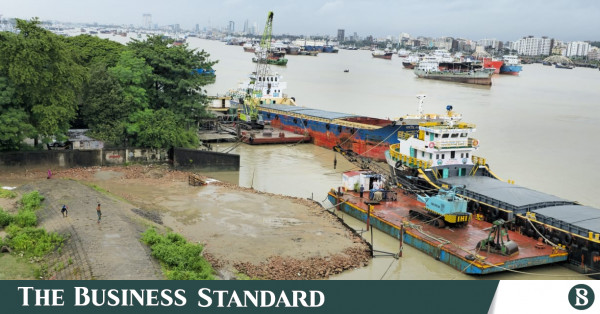The river, crucial for the country’s economy, hosts Bangladesh’s major seaport, Chattogram port, through which over 90% of export-import trade is conducted
This jetty is illegally built by Nahar Corporation and Baro Awlia Corporation on the southern bank of the Karnaphuli River near the Shah Amanat Bridge by filling the area with brick, soil and sand, causing erosion. The photo was taken recently. Photo: TBS
“>

This jetty is illegally built by Nahar Corporation and Baro Awlia Corporation on the southern bank of the Karnaphuli River near the Shah Amanat Bridge by filling the area with brick, soil and sand, causing erosion. The photo was taken recently. Photo: TBS
The Karnaphuli River in Chattogram, one of Bangladesh’s most vital waterways, is facing severe threats from encroachment. Influential individuals and organisations are taking advantage of weak monitoring to illegally claim parts of the river by filling its banks with bricks, soil, and sand.
This activity is not only obstructing the river’s natural flow but also gradually narrowing its width, leading to significant environmental and infrastructural risks.
The river, crucial for the country’s economy, hosts Bangladesh’s major seaport, Chattogram port, through which over 90% of export-import trade is conducted. The increasing encroachment along its banks has raised serious concerns about the port’s future operations.
A 2010 list by the Chattogram district administration identified 2,181 illegal establishments on the river’s northern bank. However, environmentalists believe the actual number of illegal structures on both sides of the river exceeds 4,000.
The irregular pattern of these encroachments shows the lack of consistent monitoring and enforcement. Instead of acting against the encroachers, the authorities have mostly stayed silent, letting the situation worsen.
A recent case of unchecked encroachment took place on the southern bank, near the Shah Amanat Bridge in Shikalbaha union of Karnaphuli upazila. A jetty was built there by filling the area with bricks, soil, and sand, sparking anger among locals and environmentalists.
The encroachment, reportedly done over the second and third weeks of August by Nahar Trading and Baro Awlia Corporation, took advantage of the unstable political situation, assuming that local authorities would not intervene.
Despite the clear violation of environmental laws, local authorities were slow to act. It was only after public outcry that representatives from the local upazila administration, the Chattogram Port Authority, and the Department of Environment (DoE) visited the site on 20 August.
However, instead of taking strong measures against the encroachers, the upazila administration only told them to stop filling the area and remove the materials within two days.
Residents, frustrated with the authorities’ inaction, say a powerful group has built a jetty that blocks the river’s flow, narrowing and partially obstructing it. This not only harms the river’s ecosystem but also raises the risk of flooding in nearby areas.
Mohammad Jahed, a local resident, told The Business Standard, “The authorities haven’t acted because the encroachers are influential,” a view shared by many in the community.
Jahed also said that most of the available space on the southern bank has been taken by influential industrialists. “Now, they are trying to grab the remaining open areas too,” he added, calling for strong action to protect the river from further damage.
Mohammad Habib, the owner of Nahar Trading, defended the jetty’s construction. He told The Business Standard that the jetty has been there since 2001 and that they had permission from the Port Authority at that time.
“The jetty was in use but operations stopped due to political issues, causing soil erosion. We have only added a layer of soil and bricks to it,” Habib said.
Aliur Rahman, general secretary of the Chattogram River and Canal Protection Movement, has strongly criticised the authorities for their inaction. He stressed the need to clearly define the Karnaphuli River’s boundaries and urged the district administration to quickly remove the encroachers and protect the river.
“Following a 2016 High Court ruling, authorities were ordered to identify and evict illegal encroachers on the Karnaphuli River. They made a list of 2,181 encroachers on the north bank but only evicted 350,” Aliur Rahman said.
Aliur Rahman added that the authorities stopped the eviction process too soon, leading his organisation to file another petition with the High Court last year.
“In April, the court instructed the authorities to create a new list of encroachers and evict them immediately.”
Aliur Rahman warned that if the authorities do not act properly, his organisation will file a contempt of court petition.
Karnaphuli Upazila Nirbahi Officer Masuma Jannat denied the allegations of inaction. She said that after receiving complaints, the assistant commissioner (Land) carried out a drive on 20 August.
“Representatives from the DoE and Port Authority were also there. The Port Authority confirmed that no permission was given to build the jetty. The companies were ordered to remove the earth within two days, or the Port Authority and the DoE would take further action,” she said.
Ashraf Uddin, assistant director of the DoE, added, “Our team was present during the drive. If the encroachers do not remove the illegal jetty, we will take legal action.”
On 25 August, the Port Authority issued a notice to Nahar Trading, instructing them to remove the soil encroaching on the river. Despite receiving the notice on 31 August, Nahar Trading has not yet to comply with this.


